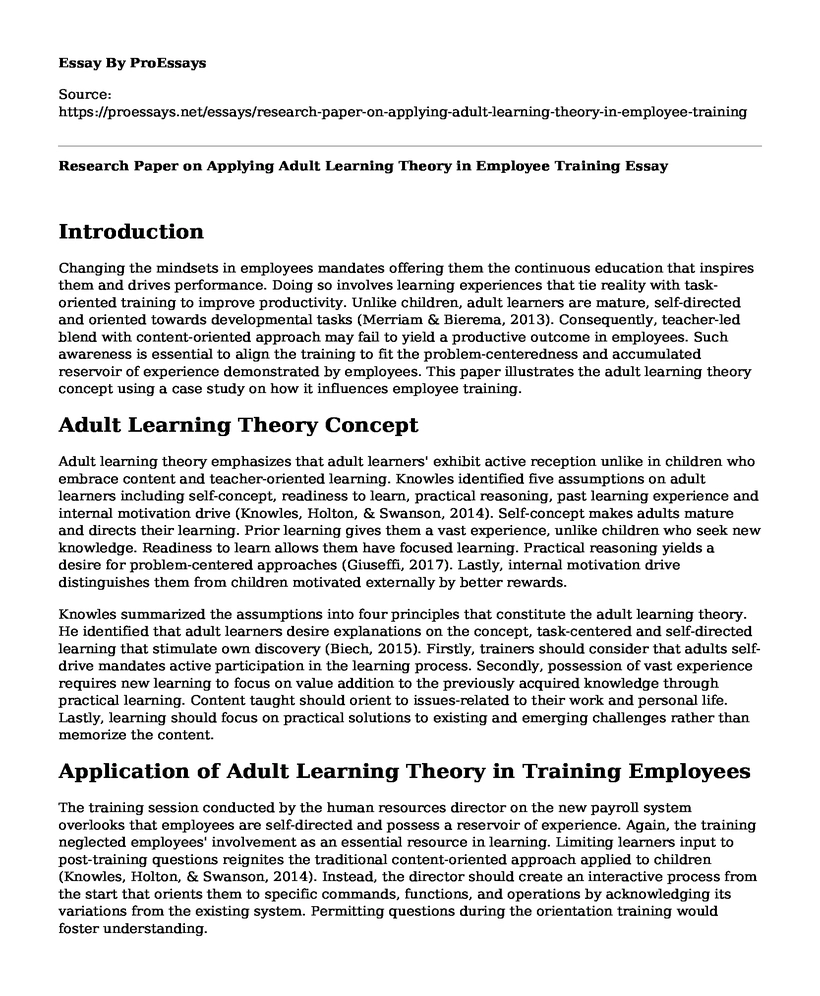Introduction
Changing the mindsets in employees mandates offering them the continuous education that inspires them and drives performance. Doing so involves learning experiences that tie reality with task-oriented training to improve productivity. Unlike children, adult learners are mature, self-directed and oriented towards developmental tasks (Merriam & Bierema, 2013). Consequently, teacher-led blend with content-oriented approach may fail to yield a productive outcome in employees. Such awareness is essential to align the training to fit the problem-centeredness and accumulated reservoir of experience demonstrated by employees. This paper illustrates the adult learning theory concept using a case study on how it influences employee training.
Adult Learning Theory Concept
Adult learning theory emphasizes that adult learners' exhibit active reception unlike in children who embrace content and teacher-oriented learning. Knowles identified five assumptions on adult learners including self-concept, readiness to learn, practical reasoning, past learning experience and internal motivation drive (Knowles, Holton, & Swanson, 2014). Self-concept makes adults mature and directs their learning. Prior learning gives them a vast experience, unlike children who seek new knowledge. Readiness to learn allows them have focused learning. Practical reasoning yields a desire for problem-centered approaches (Giuseffi, 2017). Lastly, internal motivation drive distinguishes them from children motivated externally by better rewards.
Knowles summarized the assumptions into four principles that constitute the adult learning theory. He identified that adult learners desire explanations on the concept, task-centered and self-directed learning that stimulate own discovery (Biech, 2015). Firstly, trainers should consider that adults self-drive mandates active participation in the learning process. Secondly, possession of vast experience requires new learning to focus on value addition to the previously acquired knowledge through practical learning. Content taught should orient to issues-related to their work and personal life. Lastly, learning should focus on practical solutions to existing and emerging challenges rather than memorize the content.
Application of Adult Learning Theory in Training Employees
The training session conducted by the human resources director on the new payroll system overlooks that employees are self-directed and possess a reservoir of experience. Again, the training neglected employees' involvement as an essential resource in learning. Limiting learners input to post-training questions reignites the traditional content-oriented approach applied to children (Knowles, Holton, & Swanson, 2014). Instead, the director should create an interactive process from the start that orients them to specific commands, functions, and operations by acknowledging its variations from the existing system. Permitting questions during the orientation training would foster understanding.
The director should replace the content-oriented training by engaging the employees with everyday tasks guided by the slides. Issuing handouts and freezing questions until after the presentation promotes memorization. Contrarily, the learning activity should involve illustrated interaction with the new system including demos and test cases. As earlier mentioned, the training should accommodate self-drive in employees during issuance of instructions. The training should tap into the ability of employees as self-directed adults to ease discovery by offering guidance to eliminate mistakes they make during the demos in the test-user version.
Improving the Training Session
An improved training session would require replacing the teacher-led style adopted by the human resource director. The adoption of cyclical experiential learning would engage the employees by utilizing their accumulated reservoir of experience. Firstly, the training will extend beyond the chalk-and-talk routine by creating a concrete experience through simulations. The creation of realistic scenarios through cause-effect relationships will stimulate strong emotional responses from employees (Merriam & Bierema, 2013). Secondly, the reflective observation will enable employees to garner insights through scenario-driven activities and procedures. Lastly, abstract conceptualization blend with active experimentation will enable employees acquire hands-on knowledge of the payroll functioning. References
Bibliography
Biech, E. (2015). Training and Development for Dummies. Hoboken, NJ: John Wiley & Sons.
Giuseffi, F. G. (2017). Emerging Self-Directed Learning Strategies in the Digital Age. Hershey: Information Science Reference.
Knowles, M. S., Holton, . F., & Swanson, . A. (2014). The Adult Learner: The Definitive Classic in Adult Education and Human Resource Development (8 ed.). New York: Routledge.
Merriam, S. B., & Bierema, . L. (2013). Adult Learning: Linking Theory and Practice. San Francisco, CA : Jossey-Bass.
Cite this page
Research Paper on Applying Adult Learning Theory in Employee Training. (2022, Jun 16). Retrieved from https://proessays.net/essays/research-paper-on-applying-adult-learning-theory-in-employee-training
If you are the original author of this essay and no longer wish to have it published on the ProEssays website, please click below to request its removal:
- High-Performance Human Resource Practices on Employee Annotated Bibliography
- My Contribution to Advancing Positive Social Change through Nursing
- Essay Sample on Scaffolding in the Early Childhood Classroom
- Whole Foods Working Environment Case Study Paper Example
- Essay Example on Acing the Government Exam: American & British English Converting Tips
- Our Lean Start-Up Assignment: How Teamwork Achieved Success - Essay Sample
- Essay on The Melvin's Study: The Final Factor That Led Parents to Raise Children the Way They Did







